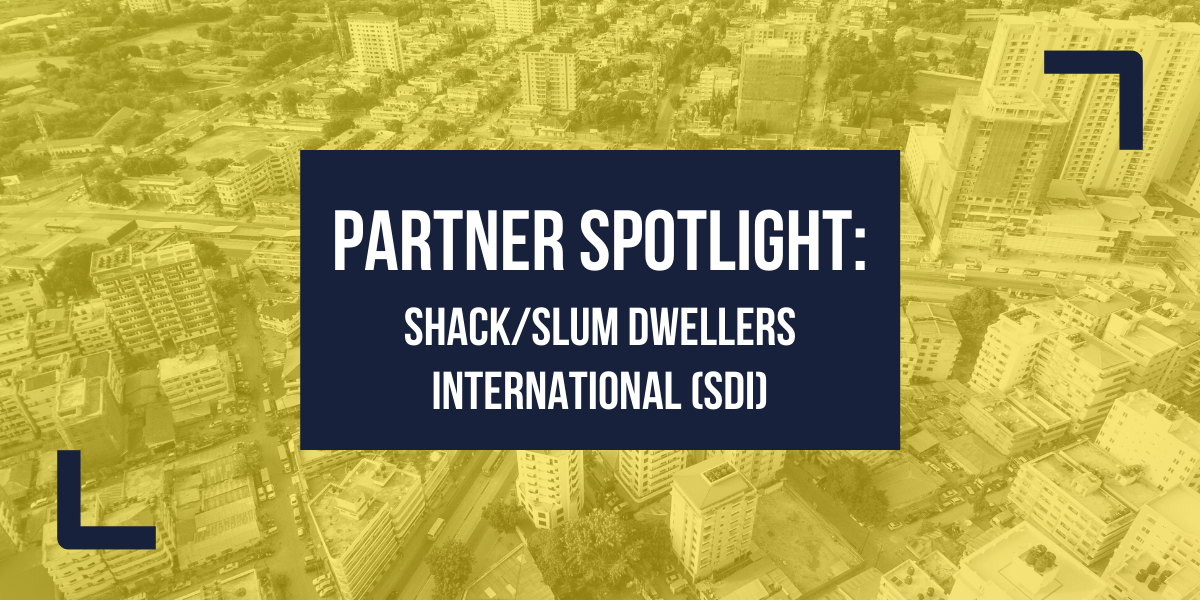Shack/Slum Dwellers International is a network of slum/shack dweller organisations federated in cities in the global South, pioneering innovation in the field of community-driven slum upgrading. Over the past 20 years, SDI has built a global slum dweller movement spanning approximately 32 countries. The movement brings together more than 1 million slum dweller households into savings groups that prioritise the central participation of women, building trust and collective capacity. These savings groups are networked at the settlement, city, national and international level to create a global slum dweller movement that takes its direction from members at the settlement level. They represent unique social capital and networks for implementing development activities and advocacy.
Beth Chitekwe-Biti is acting managing director at the SDI secretariat, the professional body based in Cape Town that organises and manages SDI network programmes. She completed a PhD at The University of Manchester, which focused on the impact of social movements on urbanisation and urban land policy. Beth has worked with social movements that are mobilising to address tenure and service delivery issues for the past 20 years and is ACRC’s action research director.

Can you tell us about SDI’s work, and the role that SDI will play within ACRC?
SDI is a network of slum dweller organisations in cities across what is proverbially known as “the global South”. We work in more than 30 countries with self-organised movements of the urban poor – mainly women-led collectives that are organised in informal settlements (slums) and face a variety of issues, the main one being secure tenure. These residents often experience evictions, live without access to water and sanitation, and may be in the process of developing some relationship with their local authorities to address these issues. They typically do this by collecting socioeconomic data about their communities, which they use to understand their own circumstances and create alternative solutions to overcome these challenges. Often, they develop or co-produce plans to present to local authorities, or to address issues within them.
In terms of our involvement in ACRC, we have affiliates in seven of the African cities where the research will be implemented, so it presents a huge opportunity for us to collaborate with The University of Manchester. As SDI, we have always valued the co-production of knowledge, where communities of the urban poor bring their own experience and knowledge into processes that seek to understand and address urban poverty and deprivation. Our biggest strength will be around the action research component of this programme, and ensuring that the research findings can be integrated into how we address the problems we identify.
What do you find most exciting about ACRC’s approach?
I think that ACRC’s cities of systems approach is right up our street, as it were. If you look at the challenges that the SDI network is trying to address, these are all interlinked. For example, you could look at the implications of tenure on economic independence, the capacity to create employment for communities, or you could look at the impact of climate change and how it affects people living in slums or informal settlements, in contrast to those living in the formal city. The challenges faced by the typical SDI affiliate in the cities that are part of the research speak volumes as to why it is necessary to approach cities as systems of interconnected issues.
“As SDI, we have always valued the co-production of knowledge, where communities of the urban poor bring their own experience and knowledge into processes that seek to understand and address urban poverty and deprivation.”
What do you think is the most crucial challenge for development in African cities?
What I see as the key challenges for development in African cities are linked to the incapacity of the state to address challenges that come with the growth of the informal city – this encompasses the criminalisation of informal work, and the inefficiencies and poverty penalty that accompany the informal provision of services such as housing, water and transportation, among other issues. National and local governments know these challenges exist but often do not take them into consideration in shaping policies at both the local and national level. I often argue that while it is common to say “the informal city”, when 80% of the population of a city is employed in “informal work” or access their transportation through the “informal transport sector”, the informal has become formal. This exclusion of informality – however it presents itself in discourses around city development in Africa – reflects an element of aspiration for a city that does not exist in practical terms.
I am Zimbabwean, and as an example, the local authorities in Zimbabwe still use building codes that are fashioned on the British Town and Country Planning Act. The reality of the Zimbabwean city is far removed from the origins of these codes, but they are nevertheless maintained in city development and codify how development should work in cities. So, I think we need a change in the perception of what city development should be. In some respects, therefore, problems have been exacerbated – because there is an idea or image of what city planning should be versus what actually happens on the ground. Again, if 80% of the population is employed in the informal sector, what is the formal sector?
Similarly, an affiliate in one African city conducted research to look at how much those in informal settlements paid for water, in contrast to those in formal settlements. It was found that they paid a “poverty penalty”, whereby poor people actually pay for services at a premium compared to those in formal settlements. There are a lot of complexities around the impacts or nature of planning processes that are formally adopted, and the implications of those for the most marginalised residents of the cities that ACRC will focus on.
“We are keen to play a part in testing how some of these complex problems can be addressed and adapted for different contexts – by replicating approaches we have found to work in one city, allowing communities to learn from each other, and reshaping this knowledge to meet local needs.”
What is most exciting for you about this project?
As SDI, we are very excited about the uptake side of the project – using the research to actually contribute to change.
Often, the areas we work in are very short on evidence. Or, when we collect the evidence ourselves, it’s not accepted, as local authorities view organisations of the urban poor as not being proficient enough to produce robust evidence. So, the co-production of this evidence will hopefully lead to uptake across a variety of stakeholders – from elites in city management to bilaterals in their programmes, who themselves have an impact in shaping the discourse around development in cities.
We are keen to play a part in testing how some of these complex problems can be addressed and adapted for different contexts – by replicating approaches we have found to work in one city, allowing communities to learn from each other, and reshaping this knowledge to meet local needs. The ambition to identify complex problems, and then to develop solutions and test these out, is something that we are looking forward to.
Read more from SDI:
- Predicting Covid-19 contagion risk hotspots
- Mbarara, Uganda: An informal community uses collective savings to deal with Covid-19
- What women want: How Covid-19 has highlighted the priorities and most pressing needs of urban poor women
- What women want – part two: To map vulnerability to climate change
Follow SDI’s work:
Note: This article presents the views of the author featured and does not necessarily represent the views of the African Cities Research Consortium as a whole.
The African Cities blog is licensed under Creative Commons Attribution-NonCommercial-NoDerivatives 4.0 International (CC BY-NC-ND 4.0), which means you are welcome to repost this content as long as you provide full credit and a link to this original post.


